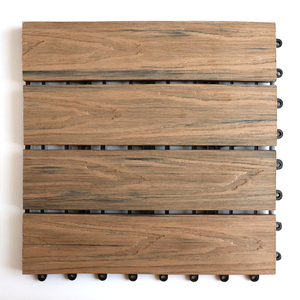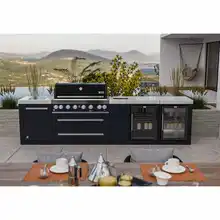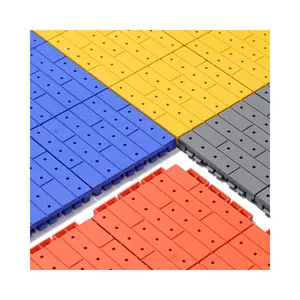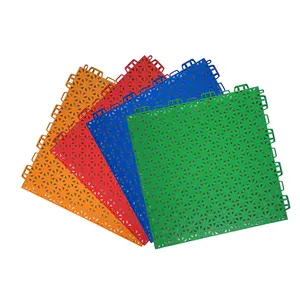What is Outdoor Interlocking Tiles
Outdoor interlocking tiles are a versatile and durable flooring solution designed to be installed in exterior spaces. These tiles are engineered to withstand a variety of weather conditions, making them ideal for patios, decks, and other outdoor living areas. Their interlocking design allows for a seamless and continuous surface that is not only functional but also aesthetically pleasing.
Intended for both commercial and residential use, outdoor interlocking tiles provide an easy-to-install flooring option that requires no adhesives or special tools. Each tile typically has grooves on the sides that fit together with corresponding tabs on the other tiles, creating a secure connection that can handle heavy loads and high foot traffic. The simple snap-together system means that the tiles can be disassembled and reassembled as needed, making them a reusable solution for temporary installations or areas where the flooring needs to be relocated frequently.
These tiles are constructed from various materials such as plastic, wood, or composite wood, each offering unique benefits like enhanced durability, resistance to moisture and fading, and varying degrees of eco-friendliness. The choice of tile material often depends on the specific application—whether it's for a high-traffic commercial area or a residential garden path. The functionality of outdoor interlocking tiles extends beyond conventional flooring; they are designed with features that cater to outdoor environments such as anti-slip properties, UV resistance, and ease of cleaning.
Types of Outdoor Interlocking Tiles
The variety of outdoor interlocking tiles available is extensive, each type designed to meet specific needs and use cases. Here's an overview of some common types:
-
WPC Interlocking Tiles: Made from a mix of wood fiber and recycled plastic, these tiles are durable, low-maintenance, and often come with warranties against rot and decay. They are an eco-friendly alternative that is resistant to water and insects, making them ideal for outdoor use in areas like parks and pool decks.
-
Rubber Interlocking Tiles: These are known for their shock-absorbent properties, making them suitable for playgrounds and sports venues where safety and cushioning are priorities. Their non-slip surfaces provide excellent traction in all weather conditions.
-
Interlocking Deck Tiles: Designed to be installed without the use of adhesives or fasteners, these tiles simply snap together using interlocking tabs or loops. They can be made from various materials including composite wood and are popular for balconies, patios, and around pools.
-
Ceramic or Porcelain Interlocking Tiles: These tiles offer a more traditional look and are often used in outdoor settings that aim for a classic aesthetic. They are less prone to fading or staining and provide a sleek surface that's easy to clean.
-
Stone Interlocking Tiles: Made from natural stone such as granite or slate, these tiles add an element of luxury and are frequently used in high-end residential and commercial spaces for their elegant appearance. They're also favored for their durability and low maintenance requirements.
How to choose Outdoor Interlocking Tiles
When selecting outdoor interlocking tiles for business purposes, it is crucial to consider the specific needs of the project at hand. For instance:
-
Functionality: Determine whether non-slip properties are essential for your intended use area. If you're looking for a tile that will be used around pools or in wet environments, opt for a material with high slip resistance.
-
Material: The choice of material should align with the durability required for the application. For areas with heavy foot traffic or exposure to the elements, choose materials like porcelain or natural stone that offer longevity.
-
Design: Consider the aesthetic aspects of the tile. If your project demands a certain design style or color scheme, ensure that your choice fits well with these requirements.
-
Maintenance: Some tiles may necessitate more upkeep than others. If maintenance needs are a concern, opt for low-maintenance options that still meet your quality expectations.
By taking into account these factors alongside the types of outdoor interlocking tiles available, businesses can make informed decisions that cater to their clients' needs while ensuring satisfaction with their product choice.
About Outdoor Interlocking Tiles on Alibaba.com
Alibaba.com stands out as a leading marketplace that brings together a vast selection of outdoor interlocking tiles suited for a multitude of applications. This platform simplifies the sourcing process for businesses by offering an extensive range of products from reliable suppliers around the globe. With Alibaba.com's user-friendly interface and efficient communication tools, buyers can easily find the right type of outdoor interlocking tile that meets their project needs—whether it's for a small residential patio or a large commercial plaza.
Moreover, Alibaba.com's commitment to facilitating seamless trade across borders is evident in its array of services such as Trade Assurance which helps protect payments up until delivery completion. This dedication ensures that businesses receive products that align with their expectations while minimizing risks associated with international transactions.
By choosing Alibaba.com as your sourcing destination for outdoor interlocking tiles, you leverage a platform that empowers small to medium-sized businesses with global trade solutions. This not only simplifies the procurement process but also contributes towards fostering business growth by accessing international markets efficiently.
Common FAQs for Outdoor Interlocking Tiles
What are the benefits of using outdoor interlocking tiles?
Outdoor interlocking tiles are designed to be durable, weather-resistant, and often feature non-slip surfaces, making them a safe choice for various outdoor settings. They are suitable for areas like driveways, patios, playgrounds, and sports venues.
How do I determine the number of outdoor interlocking tiles needed for my project?
The number of outdoor interlocking tiles required depends on the area to be covered. Measure the space and consider the size of the tiles to calculate the quantity needed, taking into account any cutting for corners or edges.
Can outdoor interlocking tiles be installed over any surface?
Generally, these tiles can be installed over a flat, level surface. Some surfaces may require additional preparation for proper installation, but it is crucial to ensure that the base is stable and even.
Are there any special considerations for installation in extreme weather conditions?
For harsh weather conditions, it is advisable to choose outdoor interlocking tiles that are specifically designed to withstand extreme temperatures, UV radiation, and moisture. Look for products with enhanced durability and weather resistance.
How do I clean and maintain outdoor interlocking tiles?
Cleaning and maintenance of outdoor interlocking tiles involve regular sweeping or vacuuming to remove debris, wiping with a damp mop, and occasionally using a mild detergent solution for more thorough cleaning.
Can outdoor interlocking tiles be used for high-traffic commercial areas?
Yes, certain types of outdoor interlocking tiles are designed to handle high traffic and heavy use, such as commercial gym spaces or sports facilities. It is important to select a product that is rated for commercial use.
Are there non-slip options available among outdoor interlocking tiles?
Yes, many outdoor interlocking tile options come with non-slip surfaces to enhance safety in wet conditions. Always check the product specifications to ensure they meet the required safety standards.
What materials are commonly used in outdoor interlocking tiles?
Common materials include plastic, rubber, wood, and stone. Each material offers different benefits in terms of durability, aesthetic appeal, and suitability for specific applications.
How do I ensure consistent color across all tiles when ordering in bulk?
When ordering in bulk, it's advisable to purchase from suppliers who provide color consistency assurances. This may involve requesting samples or checking supplier reviews regarding color consistency.
Can outdoor interlocking tiles be cut to fit irregularly shaped spaces?
Some outdoor interlocking tiles can be cut to fit irregularly shaped spaces by using a utility knife or other cutting tools. Always follow the manufacturer's instructions for trimming or custom fitting.
Is it possible to customize outdoor interlocking tiles based on design requirements?
Many suppliers offer customization options for outdoor interlocking tiles where you can specify dimensions, material composition, surface texture, and even add graphic designs or patterns to align with your project's aesthetic.
What safety certifications should I look for when choosing outdoor interlocking tiles?
Look for safety certifications relevant to your industry, such as ASTM certifications for sports venues or local safety standards for playgrounds. These show that the product has been tested for safety and meets certain requirements.
How long can outdoor interlocking tiles last before needing replacement?
The lifespan of outdoor interlocking tiles varies depending on the material and environmental conditions. High-quality materials like granite or marble may last several decades with proper care, while plastic may need replacement sooner, especially in high-traffic areas.
Are outdoor interlocking tiles suitable for all climates?
Most outdoor interlocking tiles are designed to be weather-resistant and durable enough to withstand various climate conditions. However, it's important to choose a product that specifies suitability for the local climate where the tiles will be installed.
Can outdoor interlocking tiles be used in high-impact areas like weightlifting zones?
Some outdoor interlocking tile products are specifically designed to be more durable and able to withstand high-impact activities such as weightlifting. Always verify with the supplier regarding the product's intended use to ensure it meets your requirements.










































 浙公网安备 33010002000092号
浙公网安备 33010002000092号 浙B2-20120091-4
浙B2-20120091-4